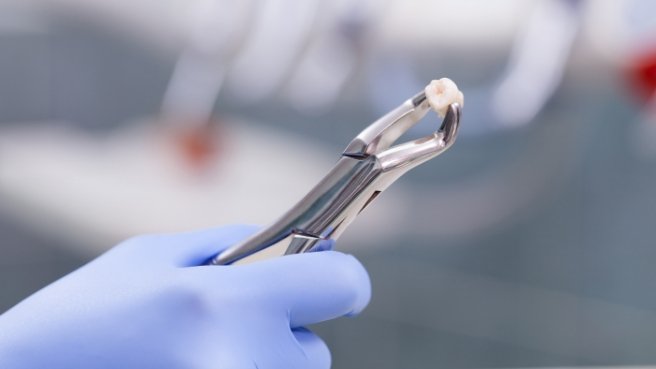Whenever possible, we do our best to preserve your natural permanent teeth. After all, you only get one set to last for your entire lifetime! However, there are situations when a tooth needs to be removed to keep you healthy and your smile strong, beautiful, and functional. If this happens, you can rest assured that you will be completely comfortable throughout the procedure and get the expert, gentle care you need to address the issue. Call us today to learn more about tooth extractions in Irving.
When Are Tooth Extractions Necessary?
At Daily Smiles MacArthur Dental and Orthodontics, we will only recommend tooth extraction when it puts your health at risk and we have no other alternative, such as in the following scenarios:
-
Your teeth are overcrowded, and you need more space to start orthodontic treatment.
-
Your wisdom teeth or third molars are coming in at an angle (or impacted), which could cause an oral infection or shift in your bite.
-
Your child’s baby teeth have not fallen out yet, but their permanent teeth need to erupt or grow in.
-
Your tooth is badly damaged and cannot be repaired with a dental crown.
-
Decay has enveloped a tooth, and the infection could spread to your other teeth or your jawbone.
-
You have advanced periodontal disease (commonly referred to as gum disease), and your teeth have become loose.
The Process of Getting a Tooth Extraction
After you and one of our dentists have determined that a tooth extraction is needed, removing the tooth goes as follows:
-
We will administer local anesthetic (and sedation if necessary) to make sure you don’t feel anything and are relaxed.
-
Depending on the location of the tooth, we will either use dental pliers to pull it or make an incision and retrieve it from underneath the gums.
-
If you are having your lost tooth replaced by a dental implant, we may perform what’s known as socket preservation to maintain the bone density in your jawbone while you heal from the extraction.
What Happens After a Tooth Extraction?
To make sure that you heal properly following tooth extraction, it’s important that you follow our instructions for aftercare. Some general tips include the following:
-
Keep gauze on the site, switching it with a clean one as needed. Allow a blood clot to form on the site.
-
Get plenty of rest and refrain from strenuous activities for a few days.
-
Use ice packs to reduce swelling and over-the-counter medication to manage any pain.
-
Eat soft foods for a few days, avoiding the extraction site.
-
Avoid using a straw for at least 48 hours. The sucking motion can dislodge the clot and lead to a dry socket, a painful infection.
-
Do not smoke or use tobacco for at least 48 hours. These products introduce harmful bacteria and can cause infections in your vulnerable mouth.
After a few days, if you experience fever, swelling, or increasing pain, contact our office.
If you’ve lost a tooth that needs to be replaced, we can talk to you about your options so that you can return to full oral health as soon as possible.
Tooth Extraction FAQs
Do you need a tooth extraction in Irving but would like to know more about the procedure before committing to it? At Daily Smiles MacArthur Dental and Orthodontics, we keep our patients in the loop throughout their entire treatment process and make sure that they remain comfortable. That’s why we’ve also answered some of the most common questions that we receive about tooth extractions below.
How often should I change my gauze?
After your tooth extraction, it’s important to keep the gauze on your extraction site to help the blood clot. After your surgery, you’ll need to change out your gauze every 30 to 60 minutes until the bleeding subsides and a clot has formed. After that, you no longer need the gauze and can remove it from the area. However, it’s important to make sure that the clot has formed beforehand. If you have any questions, feel free to contact our office.
Will I need to take off work on the day of my tooth extraction?
If you have a simple extraction involving a tooth that is removed above the gumline, then you’ll only require local anesthesia that will cause some numbing and won’t have a very long recovery time. However, if you have an under-gum extraction for wisdom teeth, then you’ll likely be administered sedation for a completely pain-free and calm experience. In this case, it’s a good idea to take a couple of days off work to make sure that your gums heal, and you have time to rest. If you’re not able to do that, try to at least rest for the remainder of the day of your procedure.
What is a dry socket and how can I tell if I have one?
A dry socket occurs when the blood clot prematurely breaks down in the extraction site. Typically, a dry socket develops between three and five days after the procedure. You can tell if you have one if you notice increased pain, bad breath, or a bad odor or taste in your mouth. If you notice any of these symptoms, we’ll provide you with a special medicated dressing every two to three days until they disappear.
Is dental sedation safe?
Many patients who have never had an oral procedure worry about dental sedation. Because this can seem like a daunting experience, our team will gladly walk you through how it works and what you will feel during your treatment. When administered by a trained professional, like Dr. Rafiq, dental sedation is completely safe and will make your appointment relaxing and pain-free.



